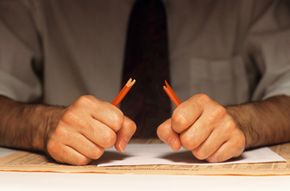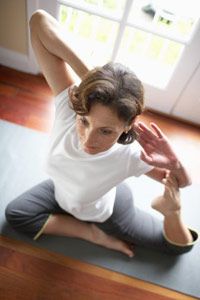You've put it off for weeks. But that pit in your stomach reminds you -- the work presentation or final exam you've been dreading is tomorrow. There's no way around it. You're going to have to do a whole lot of work in a very short period of time. As you drive to the local coffee shop to stock your body up on caffeine for a long night of work, it hits you -- stress. Stress is a natural part of our fight-or-flight response to fear, and lucky for you, it can make you more productive. But you should beware of overusing that stress response. Eventually it will backfire. It will make you more susceptible to illness and even less productive in the long haul.
During stress, your brain sends messages to your body to release certain hormones, such as adrenaline and cortisol. These hormones cause your heart rate and blood pressure to rise, your muscles to tense up and your breathing to become short and shallow. Your digestive and immune systems shut down so that you can focus all your body's energy on the task at hand.
Advertisement
Given that your immune system temporarily shuts down and that your blood pressure rises, it makes obvious sense that frequent episodes of stress will gradually wear your body down. Your immune system becomes weak, which makes you ultra vulnerable to bacterial infections and viruses. Evidence also reveals that stress contributes to heart disease. Stress hormones will actually cause the body to increase blood clotting; therefore, stress can bring on a heart attack [source: BBC News]. Not only can being overstressed hurt you physically, it's also dangerous to your mental health. There is reason to believe that stress can trigger episodes of many disorders, including panic disorder, bipolar disorder and schizophrenia.
Have you ever taken a "mental health" day off from work simply to relieve stress? If so, you're not alone. As many as a quarter of people in the workplace have taken such days off from work [source: Washington Post]. More and more people are experiencing high levels of stress in their lives. According to sources, work is the biggest stress factor for adults [source: AIS]. Work provides a significant source of stress for over 60 percent of people in the U.S. [source: Washington Post].
Now that you know stress can have dangerous consequences, are you ready to take a step back and relax? Take a deep breath and go to the next page for advice on stress relief.
Advertisement


